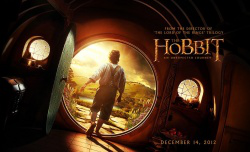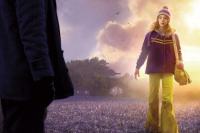Film for Christmas: The Hobbit an Unexpected Journey

It has broken box office records and divided critical opinion – a perhaps inevitable circumstance for a film under the weight of as much anticipation as the first instalment of Peter Jackson's adaptation of JRR Tolkein's 'The Hobbit'. The hobbit Bilbo Baggins is summoned by the wizard Gandalf to join a party of thirteen dwarves, led by Thorin Oakenshield, to reclaim the lost dwarf city of Erebor.
Many have complained that “nothing happens” and that we do not get to know the characters (particularly the dwarves); there is some truth in both of these claims, although neither is entirely fair. For instance, the slower pace of the action is partly dictated by elaboration of the history of the dwarves' loss of their homelands, which precisely informs our understanding of their mission, and particularly the character of Thorin. The broader issue behind these criticisms is of course Jackson's decision to adapt the book as a trilogy – it is inevitable that the action is slower than if he had condensed the book into a single film, and we will (hopefully) better get to know more of the characters in the later films (a band totalling fifteen is, after all, a lot of personalities to get to know in the space of two and a half hours). I enjoyed the film – for me, it was a delight, rather than a drag.
One of the central themes of the film is home – an apt theme for the Christmas season. Bilbo is home-loving and house-proud; when the dwarves invade his house and raid his pantry he is distraught, and when Gandalf suggests he joins the dwarves on their journey, he cannot contemplate it. Overnight, something changes. He wakes, to find the dwarves and the wizard gone and momentarily seems pleased that everything is back in order, but then he runs after them, shouting “I'm going on an adventure.” It is not clear what inspires him to join the party, but we do learn why stays, despite the lack of pocket-handkerchiefs, perilous encounters with orcs, doubts about himself, and further doubt – even mistrust – among the dwarves; he stays precisely because he loves his home, and so is moved to help the dwarves to reclaim theirs.
Bilbo, we imagine, would enjoy the idealised portrait of Christmas of good food, an open fire and carols (in spite of himself, he is taken with the dwarves' singing about their mission on the eve of their departure), but his life before he goes on his adventure is perhaps not as ideal as it first seems to be. He lives alone, and seems to delight in his solitary existence, but this has made him anti-social, and easily irritable. On his journey, he gains friends (perhaps that is precisely why he goes), and at the start of the film, we see the scene sixty-years later, at the start of the Lord of Rings narrative, in which Bilbo and his nephew Frodo are preparing for his 111th birthday party. Then, we learn, Bilbo was a well-loved and sociable fellow (although at this point somewhat less so once more, owing to the consuming-power of the ring). Christmas is a lonely time for many – some, like Bilbo, maybe partly out of choice, others through bereavement or estrangement or other kinds of loneliness. It is is time to remember the lonely, and perhaps to issue an invitation to an unexpected journey (or Christmas lunch) to the lonely we know.
The dwarves are homeless, and refugees. Christmas is a time for remembering these people too. Perhaps by donating to or helping at a shelter for the homeless, and by supporting or campaigning for refugee causes. It's easy forget that the Holy Family were homeless at Christmas too, and became refugees soon after, when Herod put a price on the Infant's head.



















